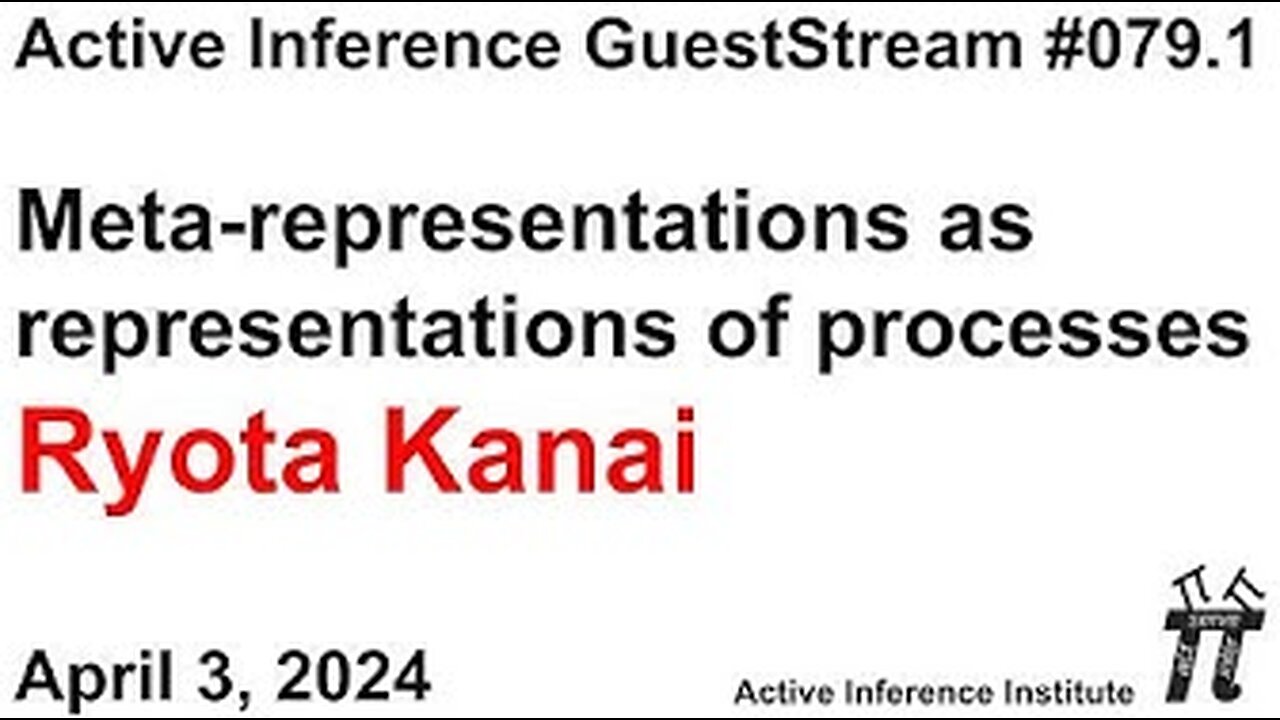Premium Only Content

ActInf GuestStream 079.1 ~ Ryota Kanai: "Meta-Representations as Representations of Processes"
"Meta-Representations as Representations of Processes"
Ryota Kanai, Ryota Takatsuki, and Ippei Fujisawa
https://osf.io/preprints/psyarxiv/zg27u
In this study, we explore how the notion of meta-representations in Higher-Order Theories (HOT) of consciousness can be implemented in computational models. HOT suggests that consciousness emerges from meta-representations, which are representations of first-order sensory representations. However, translating this abstract concept into a concrete computational model, such as those used in artificial intelligence, presents a theoretical challenge. For example, a simplistic interpretation of meta-representation as a representation of representation makes the notion rather trivial and ubiquitous. Here, we propose a refined interpretation of meta-representations. Contrary to the simplistic view of meta-representations as mere transformations of the first-order representational states or confidence estimates, we argue that meta-representations are representations of the processes that generate first-order representations. This presents a process-oriented view whereby meta-representations capture the qualitative aspect of how sensory information is transformed into first-order representations. To concretely illustrate and operationalize thus formulated notion of meta-representation, we constructed "meta-networks" designed to explicitly model meta-representations within deep learning architectures. Specifically, we constructed meta-networks by implementing autoencoders of first-order neural networks. In this architecture, the latent spaces embedding those first-order networks correspond to the meta-representations of first-order networks. By applying meta-networks to embed neural networks trained to encode visual and auditory datasets, we show that the meta-representations of first-order networks successfully capture the qualitative aspects of those networks by separating the visual and auditory networks in the meta-representation space. We argue that such meta-representations would be useful for quantitatively compare and contrast the qualitative differences of computational processes. While whether such meta-representational systems exist in the human brain remains an open question, this formulation of meta-representation offers a new empirically testable hypothesis that there are brain regions that represent the processes of transforming a representation in one brain region to a representation in another brain region. Furthermore, this form of meta-representations might underlie our ability to describe the qualitative aspect of sensory experience or qualia.
Active Inference Institute information:
Website: https://activeinference.org/
Twitter: https://twitter.com/InferenceActive
Discord: https://discord.gg/8VNKNp4jtx
YouTube: https://www.youtube.com/c/ActiveInference/
Active Inference Livestreams: https://coda.io/@active-inference-institute/livestreams
CSID: ebb7a10035fed94d
Content Managed by ContentSafe.co
-
 6:48:50
6:48:50
Akademiks
15 hours agoKendrick Lamar and SZA disses Drake and BIG AK? HOLD UP! Diddy, Durk, JayZ update. Travis Hunter RUN
161K28 -
 11:45:14
11:45:14
Right Side Broadcasting Network
9 days agoLIVE REPLAY: TPUSA's America Fest Conference: Day Three - 12/21/24
345K28 -
 12:19
12:19
Tundra Tactical
16 hours ago $12.90 earnedDaniel Penny Beats Charges in NYC Subway Killing
69K12 -
 29:53
29:53
MYLUNCHBREAK CHANNEL PAGE
1 day agoUnder The Necropolis - Pt 1
156K52 -
 2:00:10
2:00:10
Bare Knuckle Fighting Championship
3 days agoCountdown to BKFC on DAZN HOLLYWOOD & FREE LIVE FIGHTS!
59.7K3 -
 2:53:01
2:53:01
Jewels Jones Live ®
1 day agoA MAGA-NIFICENT YEAR | A Political Rendezvous - Ep. 103
151K36 -
 29:54
29:54
Michael Franzese
19 hours agoCan Trump accomplish everything he promised? Piers Morgan Article Breakdown
136K80 -
 2:08:19
2:08:19
Tactical Advisor
23 hours agoThe Vault Room Podcast 006 | Farwell 2024 New Plans for 2025
199K11 -
 34:12
34:12
inspirePlay
1 day ago $6.10 earned🏆 The Grid Championship 2024 – Cass Meyer vs. Kelly Rudney | Epic Battle for Long Drive Glory!
96.3K8 -
 17:50
17:50
BlackDiamondGunsandGear
21 hours ago $3.50 earnedTeach Me How to Build an AR-15
70.2K6